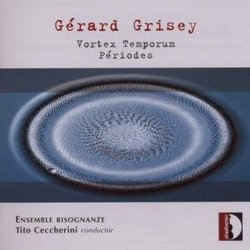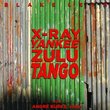| All Artists: Gerard Grisey, Ensemble Risognanze Title: Gérard Grisey: Vortex Temporum; Périodes Members Wishing: 1 Total Copies: 0 Label: Stradivarius Original Release Date: 1/1/2007 Re-Release Date: 9/4/2007 Genre: Classical Styles: Chamber Music, Historical Periods, Classical (c.1770-1830) Number of Discs: 1 SwapaCD Credits: 1 UPC: 8011570337344 |
Search - Gerard Grisey, Ensemble Risognanze :: Gérard Grisey: Vortex Temporum; Périodes
 | Gerard Grisey, Ensemble Risognanze Gérard Grisey: Vortex Temporum; Périodes Genre: Classical
Gérard Grisey (1946-1998), a giant of contemporary music in France, was one of the prime movers of what came to be known as the "Spectral Movement," or Spectralism, in the mid-1970s. This genre emphasizes the pitch, t... more » |
Larger Image |
CD DetailsSynopsis
Album Description Gérard Grisey (1946-1998), a giant of contemporary music in France, was one of the prime movers of what came to be known as the "Spectral Movement," or Spectralism, in the mid-1970s. This genre emphasizes the pitch, timbre, and rhythm of individual sounds in composition, usually employing computer analysis of sound waves and their evolution through time. This approach was developed at IRCAM in Paris and gradually became a major influence in avant-garde music. Similar CDs
|
CD ReviewsGrisey at his most inventive, though not entirely satisfying Christopher Culver | 03/25/2009 (3 out of 5 stars) "This Stradivarius disc brings together two works by the French composer Gerard Grisey (1946-1998). Tito Ceccherini conducts the Ensemble Risognanze. Grisey was one of the founding figures of the spectralist "school of"--or better yet "attitude towards"--composition. His most famous quotation is "We are musicians, and our model is sound and not literature, sound and not mathematics, sound and not theatre, or fine arts, quantum physics, geology, astrology, or acupuncture." His music is often built up of acoustics itself, analysing sound wave and representing alterations of them by assigning portions to instrumentalists.
"Vortex Temporum" for ensemble (1994-96) is a good example of this approach. Everything began with a single chord from Ravel's "Daphnis et Chloe". Grisey captured the sound as the piece was performed, and chose to use its waveform as material. We hear the waveform performed in all kinds of variation, and as sinusoidal, as a square wave, or as a jagged wave (a fearsome solo on a piano tuned a quarter tune lower). As the movement goes on, that initial sound gets stretched more and more until it's ultimately unrecognizable. This is pretty standard spectralism and the sort of the thing that Grisey had already been doing for two decades, but the second movement reveals his major concern of his late career: musical time. Here the same sort of material appears, but in greatly expanded time, such that the listener loses his perception of what is going on. The third movement, on the other hand, goes from this ungraspable state of affairs back towards the flow of the first movement. While based on egg-headed theories, Grisey's music is generally quite listenable, with all kinds of lovely sounds arising. One needn't fear modernist "dissonance" here, as the movement that Grisey was part of was turning towards the source of consonance itself. However, I do not think "Vortex Temporum" an entirely successful piece since it does indeed lose gestalt in the second movement, even for careful listeners, and as a result one's attention wanders and the whole piece seems overlong. The performance sounds confident, but I cannot compare it to anything, having not heard the other extant recording of the piece on Accord where Kwame Ryan conducts the Ensemble Recherche. "Periodes" for 7 players (1974) is one of Grisey's earliest mature efforts. It explores the contrasts between clockwork periodicity and more supple rhythms suggestive of human breathing. The performance here is competent, but I much rather prefer to hear the work as a part of Grisey's masterpiece cycle "Les Espaces Acoustiques" (best heard on another Accord release). Even if "Vortex Temporum" isn't Grisey's best work, it does have a number of interesting moments for fans of the composer. But if you're new to him, get "Les Espace Acoustiques" first." |

 Track Listings (4) - Disc #1
Track Listings (4) - Disc #1


